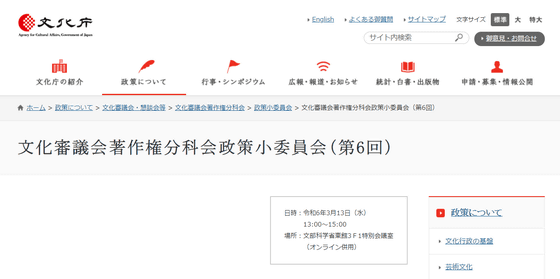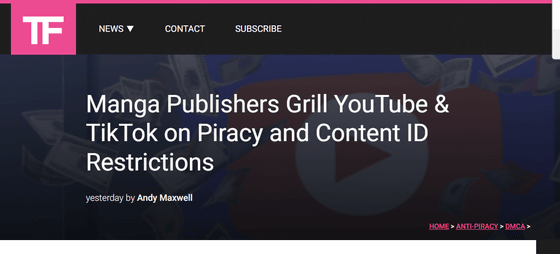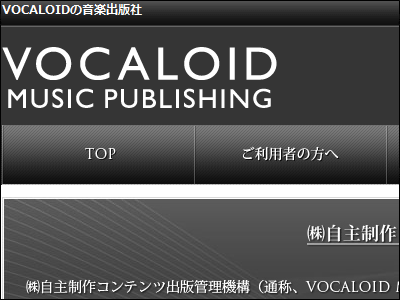Manga publishers slam YouTube and TikTok for making Content ID copyright management useless for publications

TorrentFreak, an overseas news site specializing in copyright and piracy, has reported that at a policy subcommittee meeting of the Copyright Subcommittee of the Council for Cultural Affairs held by the Agency for Cultural Affairs, which is under the jurisdiction of the Ministry of Education, Culture, Sports, Science and Technology of Japan, on March 13, 2024, a committee member from a publishing company made harsh comments to representatives of Google, the operator of YouTube, and ByteDance, the operator of TikTok.
Council for Cultural Affairs Copyright Subcommittee Policy Subcommittee (6th) | Agency for Cultural Affairs

Manga Publishers Grill YouTube & TikTok on Piracy and Content ID Restrictions * TorrentFreak
https://torrentfreak.com/manga-publishers-grill-youtube-tiktok-on-piracy-and-content-id-restrictions-240416/

The minutes of the Copyright Subcommittee Policy Subcommittee meeting are available on the Agency for Cultural Affairs website. Google representative Kito, who is in charge of YouTube music partnerships, and ByteDance representative Kato, who is in charge of licensing at Global Music Business Development, also attended the meeting.
Google's Kito spoke about YouTube's efforts towards transparency through the Copyright Transparency Report and other means. YouTube identifies and manages copyrighted music and videos using ' Content ID .' When a video is uploaded to YouTube, a Content ID is registered, and when the same music or video is newly uploaded, the video is automatically blocked from viewing and revenue distribution is set.
However, Content ID only targets video and audio, so it cannot handle the scanning of publications, editing them into videos, and uploading them.

Atsushi Ito, a member of
There are a lot of videos uploaded on YouTube, such as still images from publications, mainly manga, which are flip-flopped like a picture-story show, or picture books, where the user reads aloud while turning the pages themselves. Regarding Content ID, Content ID does not work at all on illegal videos of publications, so publishers hire specialized companies or search YouTube themselves to find and delete infringing videos. People in the music industry and JASRAC have also made statements to the effect that it's fine because they will be reimbursed through Content ID, and it has been announced that about $1.8 billion has been reimbursed through Content ID for catching pirated copies, which I thought was a huge amount. The music industry as a whole has made $1.8 billion, but I strongly felt that publishers have not received any reimbursement for catching pirated copies through Content ID.
In response, Google's Kito said, 'My role is essentially limited to music partnerships in Japan, so I hope you understand that I'm not in a position to answer that question.'
ByteDance's Kato also said, 'TikTok has not yet been able to introduce a system like YouTube's Content ID for master recordings, but what we need to consider here is whether a system like Content ID is best, or whether we should go for a comprehensive contract like the ones we have now with labels, where the amount is decided in advance, or which one would really fit Japan, and which would fit the TikTok service.' He showed a positive attitude toward introducing a system like Content ID.

Therefore, Commissioner Ito expressed the following opinion regarding ByteDance:
Before I ask my question, I would like to share my thoughts on the overall situation with TikTok. We have talked a lot about fairness, but in our work with the music industry, we have properly handled the rights with TikTok, properly supplemented the rights, and the music industry is properly compensated. However, when it comes to publications, although we do receive some compensation from TikTok sales, there are a lot of pirated publications uploaded on TikTok. For many years, I have been taking measures, including against YouTube, and in the past, when it comes to video sharing sites, YouTube had an overwhelming number of pirated versions, and in the most common months, we deleted about 20,000 videos. However, since around this summer, TikTok has finally overtaken YouTube, and now, depending on the month, there are two to three times as many pirated versions uploaded to TikTok. This is a big problem for us, and our staff and the people at the infringement prevention company are deleting them every day, but the number is not decreasing.
Commissioner Ito then posed four questions: 'Are you aware of the current situation in which there are a large number of pirated copies of publications, including manga?', 'Are you aware of the situation in which pirated copies are likely to appear in recommendations?', 'Compared to YouTube, it is the experience on the ground that malicious accounts are less likely to be suspended. Are you aware of this situation?', and 'Are you aware of the current situation in which users unfortunately have little awareness of copyright?'
ByteDance's Kato responded, 'This seems like a very positive idea, so I would like to take it back to the company and consider it,' but avoided giving a specific answer as it was outside the scope of his job.
Related Posts:
in Web Service, Manga, Posted by log1i_yk







